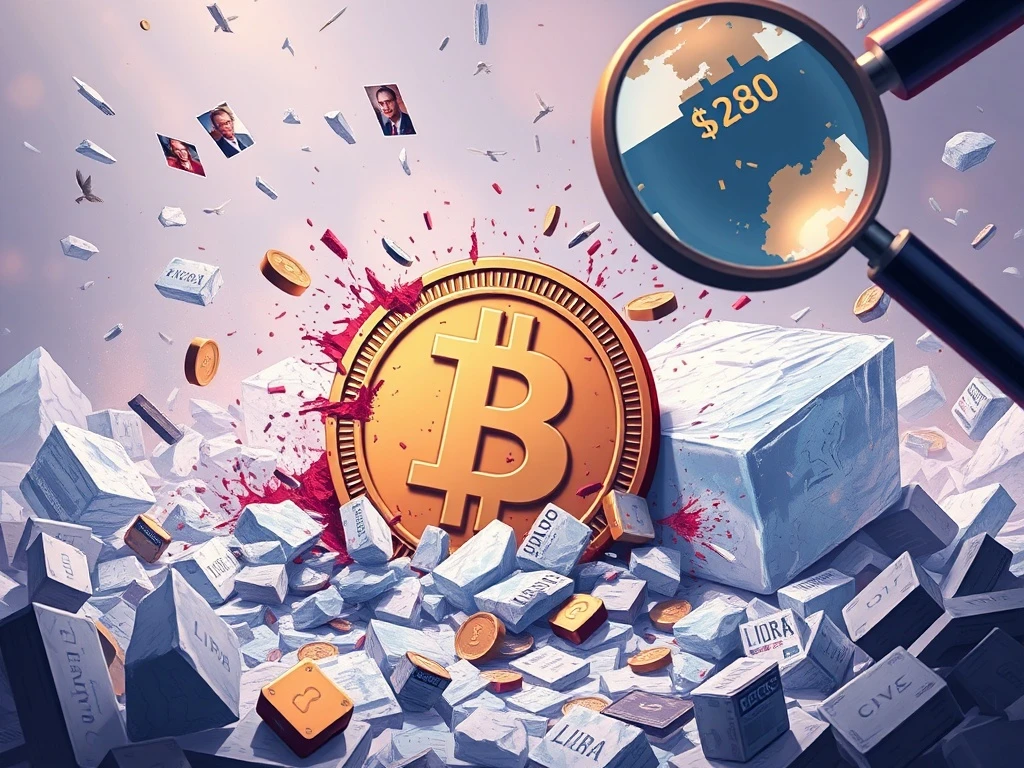LIBRA Token Scandal: The Catastrophic Collapse of a ‘Memecoin’ Empire and Global Regulatory Fallout

The cryptocurrency world is reeling from an astonishing development: the LIBRA token scandal. What began as a seemingly promising digital asset has spiraled into a global controversy, with its founder reclassifying it as a mere ‘memecoin’ amidst a massive U.S. asset freeze and shocking political revelations. This saga underscores the volatile nature of unregulated digital assets and the urgent need for robust oversight.
What Triggered the LIBRA Token Scandal?
The core of the LIBRA token scandal lies in the dramatic admission by its founder, Hayden Davis. In a recent court statement, Davis openly declared that the LIBRA token had “no business plan, roadmap, or clear goals.” Instead, he characterized it as a viral, social media-driven project, effectively a ‘memecoin.’ This statement starkly contradicts earlier promotional materials that positioned LIBRA as a high-return investment, leading to serious questions about potential misrepresentation to investors.
- Lack of Fundamentals: Davis’s admission highlights that LIBRA was never designed with a tangible product or service in mind, a common characteristic of many speculative memecoins.
- Promotional Discrepancy: The stark difference between the token’s initial marketing as a legitimate investment and its subsequent reclassification as a ‘joke’ or ‘social experiment’ has ignited legal debates.
- Investor Deception: Legal experts are scrutinizing whether this retroactive labeling can shield promoters from liability, especially if evidence points to intentional deception from the outset. This could set a significant precedent for how crypto projects are launched and marketed.
The Memecoin Controversy: A Shield or a Trap for Promoters?
The memecoin controversy surrounding LIBRA’s reclassification is more than just a semantic debate; it has profound legal and regulatory implications. While memecoins are known for their speculative nature and community-driven hype, intentionally marketing a project as an investment and then retroactively labeling it as a memecoin to evade responsibility is a different matter entirely. This move by Hayden Davis has drawn sharp criticism and raised questions about accountability in the decentralized space.
Regulators are increasingly concerned about projects that exploit investor enthusiasm without providing clear disclosures about inherent risks. The LIBRA case emphasizes the fine line between genuine community-driven projects and those that might be designed to mislead. It forces a crucial discussion on whether a token’s classification can be altered post-launch to avoid legal repercussions, especially when significant investor losses have occurred.
Crypto Regulatory Crackdown Intensifies: The U.S. Response
The U.S. authorities have responded decisively to the unfolding scandal, freezing a staggering $280 million in assets linked to LIBRA. This aggressive move signals an intensifying crypto regulatory crackdown on projects deemed to be engaging in fraudulent or misleading practices. Both U.S. and New York authorities are conducting separate probes, with a critical hearing scheduled for August 19 to address LIBRA’s operations and its controversial political ties.
This action by U.S. regulators sends a clear message to the broader crypto market: while innovation is encouraged, investor protection remains paramount. The freezing of assets demonstrates a growing capacity and willingness by traditional financial oversight bodies to intervene in the digital asset space, even for projects that attempt to skirt traditional classifications like ‘securities’ by labeling themselves as ‘memecoins.’ The outcome of this legal battle could significantly influence future regulatory approaches to nascent and speculative crypto ventures.
Hayden Davis’s Controversial Moves: The $500K Transfer to Milei
Adding another explosive layer to the scandal are revelations of a $500,000 cryptocurrency transfer to Argentina’s President Javier Milei. This transaction occurred during a June 2025 meeting with Hayden Davis and was flagged by investigators, triggering inquiries into potential financial misconduct and opaque political dealings. President Milei’s administration, known for its pro-crypto stance, has denied involvement in LIBRA’s operations, yet the transfer fuels speculation about the use of digital assets for unregulated political transactions.
The incident highlights a critical vulnerability in the global financial system: the potential for digital assets to facilitate transactions that circumvent traditional transparency and oversight mechanisms. This raises significant concerns for international bodies and anti-money laundering efforts. The public nature of this alleged transfer to a head of state makes the LIBRA case unique, setting a precedent for how such interactions might be viewed and regulated in the future, especially concerning the ethical implications of crypto endorsements involving public figures.
The Fallout: Protecting Against Political Crypto Donations and Market Risks
The collapse of LIBRA, which saw a devastating 95% loss of its value, has caused significant financial and emotional distress for countless retail investors. Davis’s admission that the token was never designed as an investment product underscores the inherent risks in meme-coin ecosystems, where hype often overshadows fundamental value and regulatory oversight. This situation serves as a stark warning about the dangers of speculative investing driven by social media trends rather than sound financial principles.
The controversy surrounding the alleged political crypto donations has amplified calls for increased scrutiny of crypto endorsements, particularly those involving public figures. Analysts suggest this scandal could accelerate the development of clearer guidelines and regulations for how politicians and celebrities interact with and promote digital assets. The LIBRA case, while drawing comparisons to other memecoin incidents like DOGEKING, stands out due to its scale and the direct political entanglements, making it an unprecedented benchmark for future regulatory actions and investor education efforts. It emphasizes the critical need for investors to conduct thorough due diligence and understand the underlying nature of any digital asset before committing capital.
The legal proceedings against Hayden Davis and the ongoing investigations highlight broader challenges in regulating digital assets across borders. While Davis has not admitted wrongdoing, the reclassification of LIBRA and the flagged political transactions have intensified debates about transparency in cross-border crypto dealings. Regulators are increasingly focused on ensuring that even highly speculative assets like memecoins do not exploit investors while circumventing traditional financial safeguards. The outcome of Davis’s case may indeed set a significant precedent for how similar projects are evaluated, potentially reshaping fundraising practices and investor protection measures in the rapidly evolving meme-coin space.
Frequently Asked Questions (FAQs)
1. What is the LIBRA token scandal?
The LIBRA token scandal involves its founder, Hayden Davis, reclassifying the token as a speculative ‘memecoin’ despite earlier promotions as a high-return investment. This occurred amidst U.S. authorities freezing $280 million in assets and revelations of a $500,000 crypto transfer to Argentinian President Javier Milei, leading to probes into financial misconduct and regulatory oversight.
2. Why did Hayden Davis reclassify LIBRA as a memecoin?
Hayden Davis reclassified LIBRA as a memecoin in a court statement, admitting it had “no business plan, roadmap, or clear goals.” This move appears to be an attempt to distance himself from liability for misrepresentation, positioning the token as a viral social media project rather than a traditional investment product.
3. What is the significance of the $500,000 transfer to President Milei?
The $500,000 cryptocurrency transfer to President Javier Milei during a meeting with Hayden Davis has triggered inquiries into potential financial misconduct and opaque political dealings. It raises significant questions about the use of digital assets for unregulated political transactions and the transparency of such dealings, especially involving public figures.
4. How does this case impact crypto regulation?
The LIBRA token scandal is intensifying the global crypto regulatory crackdown. It highlights the challenges in regulating speculative digital assets and cross-border transactions. The case is expected to set precedents for how memecoins are evaluated, potentially leading to stricter rules on crypto promotions, endorsements, and financial transparency for digital assets.
5. What are the risks of investing in memecoins, as highlighted by the LIBRA case?
The LIBRA case underscores the extreme risks of investing in memecoins, which often lack fundamental utility, clear roadmaps, or business plans. Their value is primarily driven by hype and social media trends, making them highly volatile and susceptible to rapid, significant value loss, as seen with LIBRA’s 95% collapse. Investors face high risks of financial loss due to speculation and limited regulatory oversight.
6. What should investors learn from the LIBRA collapse?
Investors should learn the critical importance of due diligence before investing in any digital asset, especially memecoins. It highlights the need to scrutinize project fundamentals, understand the difference between speculative assets and legitimate investments, and be wary of projects promoted solely on hype or by celebrity endorsements without clear disclosures. The case reinforces the need for caution and awareness of evolving regulatory landscapes.










